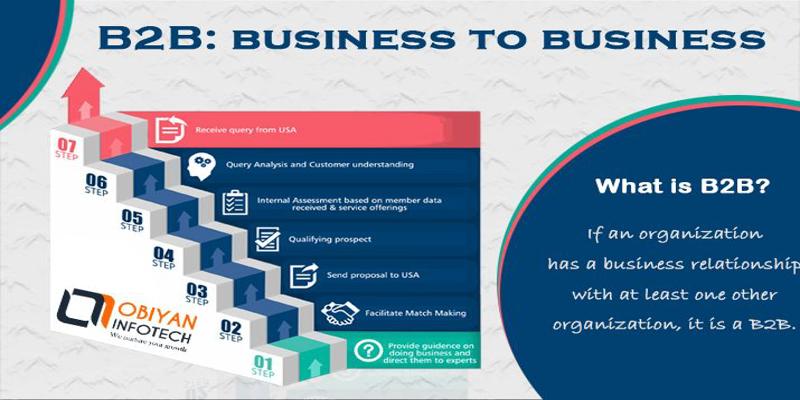What Is Business-to-Business (B2B)? Definition and Guide
Nov 12, 2024 By Aldrich Acheson
Business jargon is part of one's everyday existence in an interlinked business world - one must have heard about the term "B2B" or "Business-to-Business." But what is this thing, and what does this practically mean in your company functions? This comprehensive overview will illustrate what B2B truly is, as defined by its crucial characteristics and what it practically involves in actual life across any industry. Whether you are an old-guard CEO or some young tyro entrepreneur navigating that maze of intercompany and company-to-company transactions, B2B plays a rather important role in your journey ahead. Learn how B2B strategies drive growth, smoothen processes, and forge valuable partnerships that move the needle in today's ultra-competitive marketplace.
Defining Business-to-Business (B2B)
 B2B, as it is commonly referred to, is a form of commercial transaction or business model in which business enterprises sell products or services directly to other businesses rather than to individual consumers. It is the backbone for many industries and supply chains and provides a channel between organizations to exchange goods, services, and information.
B2B, as it is commonly referred to, is a form of commercial transaction or business model in which business enterprises sell products or services directly to other businesses rather than to individual consumers. It is the backbone for many industries and supply chains and provides a channel between organizations to exchange goods, services, and information.
Key Characteristics of B2B
Business-to-business transactions, by and large, normally encompass larger quantities ordered, more expensive deals, and a more complex decision-making process compared to B2C. Such deals generally involve longer sales cycles because the purchase normally gets routed through several levels in the organization. In B2B, the interaction normally targets developing long-term partnerships rather than single transactions.
Types of B2B Transactions
The following are some of the common types of B2B transactions;
- Wholesalers to retailers
- Manufacturers to distributors
- Service providers to businesses
- Software companies to enterprises
Each of the above relationships is important in its own right, and together, they contribute to the big business ecology so that firms can have expertise in their skill sets and depend on specialized partners for everything else.
The Impact of Technology on B2B
There has been a sea change in the world of B2B in the last couple of years. E-commerce platforms, CRM systems, and data analytics have smoothened B2B processes, making them quicker and heavier on data. The effect of all this is that these digital marketplaces and sophisticated online procurement systems started to upend how business entities interact and transact.
How B2B Differs from B2C
While the B2B and B2C models may appear similar, strong characteristics differentiate them. This differentiation enables the companies to build strategies fairly well.
Target Audience
The target market in B2B includes other businesses or organizations. Most entities make buying decisions based on logic, ROI, and long-term value. B2C is directed toward the individual consumer, who tends to be emotive when purchasing. It's based on personal preference and immediate gratification.
Buying Process
The B2B buying process is usually more complex and longer. It involves more than one decision-maker, much research, and a long time in negotiations. In contrast, B2C transactions are often simple and fast, as consumers make individual decisions or with at most minimal consultation.
Relationship Building
B2B relationships are often long-term oriented and partnership-based. Firms have to invest a lot of time and resources in maintaining these relations through support and solutions given at the right time. B2C is, therefore, more transactional, and less attention is paid to having deep, ongoing relationships.
Marketing Approach
B2B marketing educates; it informs and brings industry knowledge down the value curve. Standard tools include content marketing, white papers, and case studies. B2C marketing, however, relies heavily on emotional appeal, lifestyle association, and immediate gratification. Standard tools for B2C include social media, influencer partnerships, and eye-catching ads. Pricing Strategies
Benefits of B2B to Businesses
 Business-to-business purchases offer great value to companies across many industrial sectors. Let's examine some key advantages that make B2B an attractive business model for many organizations.
Business-to-business purchases offer great value to companies across many industrial sectors. Let's examine some key advantages that make B2B an attractive business model for many organizations.
Improved Productivity and Money Savings
The development of B2B relationship-building commonly results in smoothing operations and reducing business costs. Direct interaction with other companies eliminates intermediaries, streamlining supply chains and making them more efficient, with lower prices for goods and services. This will allow direct interaction whereby bulk purchasing can be made to bring down the per-unit cost for a better profit margin.
Partnerships Long-term and Stability
The most valuable feature of B2B relationships is that formed partnerships might be long-lasting. B2C transactions are often one-off deals or infrequently, while in B2B, many deals involve contracts and recurrent business. This enduring relationship gives a company some sense of stability about returns and, therefore, plans for the future with greater confidence.
Access to Specialized Expertise
Equally, B2B often involves working with industry specialists with expert knowledge and experience. A firm could have access to such expertise, a factor to be considered mainly for a firm seeking to enter new markets or develop new products. Working with well-informed partners may improve product quality and enhance services to gain a competitive advantage in the marketplace.
Customization and Flexibility
The extent to which B2B manages to deliver customizations more or less often surpasses the scope in B2C. Most businesses will provide products or services to a corporate customer in more bespoke forms than would otherwise be achievable when dealing with a consumer-led market. With this assistance, corporations tend to foster more personally familiar relationships and trust based on greater customer satisfaction. Flexibility enhances opportunities to handle changes prevailing in the market and, through them, to attend to customers for long-range performances within the B2B.
B2B Marketing Strategies and Tactics
In B2B trade, strategic marketing forms the success. Here, marketing strategies will vary significantly from B2C marketing since the campaigns target decision-makers in organizations, not consumers.
Content Marketing
This happens when content marketing is regarded as the backbone of B2B marketing strategies. Writing whitepapers, case studies, and industry reports produces relevant and valuable content businesses can rely on when establishing themselves as thought leaders and gaining customer credibility. This approach educates potential prospects and nurtures those leads through the sales funnel.
Account-Based Marketing
It quickly shone in the B2B circles as one of the most targeted methodologies for account-based marketing. This method involves tailoring marketing efforts around prospective high-value accounts. Businesses can increase engagement and conversion rates among their most promising prospects by personalizing content, outreach, and campaigns for individual target companies.
LinkedIn and Social Selling
Thus, LinkedIn has become the leading social channel for B2B marketing. Pros use it to connect, share knowledge and insights, or research potential partners or vendors. Commenting or sharing prospects' content or relevant industry information, among other social selling practices, allows professionals to establish relationships and earn trust before any sales engagement.
Trade Shows and Events
While digital mediums are becoming increasingly prevalent in the marketing landscape, nothing substitutes for in-person events in B2B. Trade shows, conferences, and industry events allow an opportunity for face-to-face networking, product demonstrations, and relationship building. These can be high-quality leads and building connections that can sometimes be impossible via digital channels.
Conclusion
It is about relationships, understanding clients' unique needs, and continuously delivering value. By taking advantage of this article's strategies and best practices, you can put your company in a strategic position for exponential growth in the B2B marketplace. Keep yourself informed about industry trends, embrace digital transformation, and continually refine your approach to meet customers' evolving expectations. Let your B2B business rise to the excellence challenge with a customer-centric mindset. The B2B market is full of immense opportunities that usher your organization toward success.

Dec 01, 2024 Pamela Andrew

Nov 12, 2024 Pamela Andrew

Nov 10, 2024 Triston Martin

Dec 28, 2023 Triston Martin

Sep 02, 2024 Sid Leonard

Nov 06, 2024 Pamela Andrew